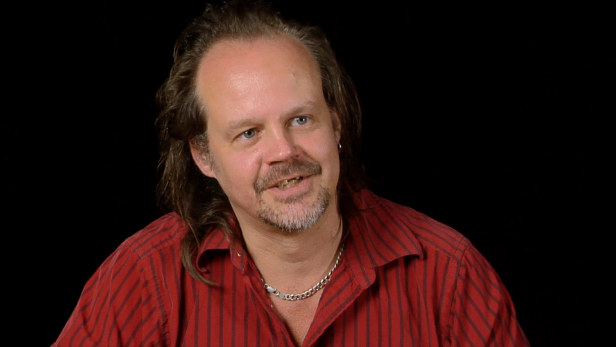 Larry Fessenden is a giant of independent genre cinema. He’s directed excellent films like Wendigo, The Last Winter and Habit, as the head of Glass Eye Pix he’s worked with filmmakers like Ti West, Jim Mickle and Kelly Reichardt, and he’s died in so many films that he’s got his own death reel. It’s a fact that if you see Fessenden’s name somewhere in the credits of a movie, you’ve picked a good one.
Larry Fessenden is a giant of independent genre cinema. He’s directed excellent films like Wendigo, The Last Winter and Habit, as the head of Glass Eye Pix he’s worked with filmmakers like Ti West, Jim Mickle and Kelly Reichardt, and he’s died in so many films that he’s got his own death reel. It’s a fact that if you see Fessenden’s name somewhere in the credits of a movie, you’ve picked a good one.
One of the films in which he stars is Dan Berk and Robert Olsen’s indie thriller Body, in which three girls head to a supposedly empty mansion to spend the night before Christmas Eve. When they’re surprised by the caretaker (Fessenden), someone ends up in a broken heap at the bottom of the stairs…No prizes for guessing who.
We were lucky enough to talk to Fessenden about the film, getting killed on screen so regularly, the state of studio genre movies, the challenges facing young filmmakers and why he’s happy to be a horror guy.
Body is one of three films you star in showing at Film4 FrightFest this year, with Pod and We Are Still Here. How do these acting appearances come about?
Well, the horror community is a small one. Mickey Keating who did Pod was an intern at Glass Eye Pix, and We Are Still Here, my friend Ted Geoghegan the director, and he came to me and invited me to be in that. Body, I didn’t know the directors but I knew one of the producers. So it’s a small community, we all kind of know each other from such events as the festivals.
Body’s an interesting part for you. What drew you to a character who’s incapacitated for most of the film?
Well that’s true, but I’m also the title character! [laughs] I think they were trying to emphasise that. “Well, your name is on the poster!” I’m up for a challenge. I find all of that very interesting and I am interested in horror and all of the various things that are horrific, and one of them of course is being paralysed in some way. And the predicament the character is in I found intriguing. What I also liked was that, because of the way the script is written, is I get to play a villain briefly in the flashbacks as they imagine an alternative story. That was my favourite element of the script, this Rashomon way of seeing my character, both as a mad rapist and also truly as the victim that he is in the story.
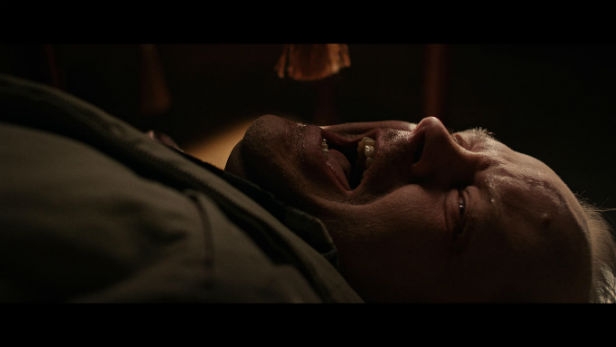
The three actresses in the film are fantastic as well.
They were great. Well, Helen [Rogers] and I have an awkward scene and luckily we’re pals, and I also know Lauren Molina. So it was a very friendly set in that regard. I think the strength of the movie is the girls and especially in the beginning, before there’s even a cause for tension, I just like their rapport. Certainly what interests me in horror, is to ground the film in something very naturalistic and you really become engaged with these people. And then when there’s a change, when something goes wrong, it’s more harrowing.
I think in the UK my movies aren’t very well seen but I have a box set coming out in America with my old films, and a movie I made called Habit is also slow burn, you barely know you’re in a genre film. It’s just this sense of dread starts to creep in, and of course that what I loved about Ti West’s work and why we forged a bond. I love horror in the place that you get to, but I am less fond of when the credit music announces that you’re in a horror movie. I prefer to creep in, the way it would in real life, so that’s always been what interests me and I think the movies we’re talking about have a little of that.
How do people approach you about appearing in their films? Do they have a character in mind for you?
To be an actor, they want me to be someone who gets killed right away! You can be guaranteed I have a three page arc! That’s just the nature of it. I even have a death reel online somewhere. Soon it will be feature length!
I don’t know, that’s how people think of me, of course I’ve done other types of roles and I enjoy when I’m able to do something a little different. When I was little I wanted to be an actor and I idolised Robert De Niro, when he was young, every movie you could barely recognise him. That’s always been the great romance for me as an actor, to be able to change persona. Now of course when I get on set they always say “Keep the rings, keep the teeth and the funny hair.” So in a way I walk on like my goofy self, but I get to change up a little bit.
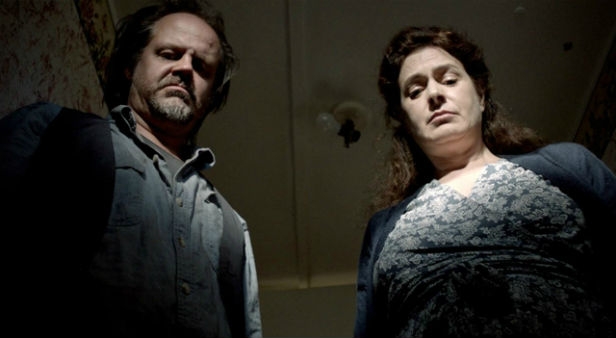
There have been movies where you get more of a character to play. We’re big fans of Jug Face…
I really like that too, a more sympathetic character, and a little more air time. Although I don’t need a lot of air time, it’s really the role and something different. I think my instinct, just as we’ve said that I like to ground a scary movie in a certain reality, I like to find the sympathetic element of a character, even if he’s a villain, especially if he is, because I think that becomes more interesting. When I direct actors I never tell them to play the villain, I always say “Let’s find the vulnerable part of this character, the vulnerable part that may make them in fact lash out.” Certainly the hunter in Wendigo, I tried to find his motivation beyond just being a moustache tweaking villain.
The Last Winter has a lot of that as well, with those characters in a stressful environment.
Right, and I wanted the villain to be charming, which is why I cast Ron Perlman, and then the environmentalist who might be the hero, he’s a little off. So that’s the idea, to blur it so it doesn’t become a political diatribe. It’s sort of about how we all find our solutions in different ways and everybody is just trying to figure it out. But, mind you, some people’s behaviour can become villainous and encroach on others, and on it goes. It’s why I haven’t made probably a straight slasher movie, that’s maybe not my orientation, I’m not quite as interested in that.
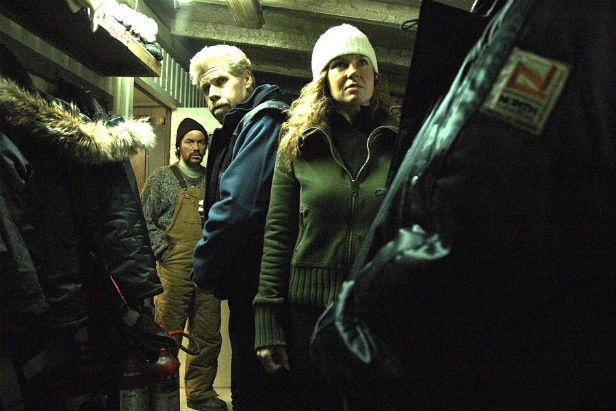
You’ve said before that you’re more interested in supernatural horrors than human evil, why is that?
I guess I find humanity so atrocious that I don’t need to just make a straight play on that. I’m more interested in evoking a more transcendent element, which is to remind the viewer that there are things we can’t understand and it’s not all human-centric, there’s something else. And I’m not speaking of God in a religious sense, but there’s a sort of otherness. There’s the great writer Algernon Blackwood who tries to address that. It’s a fear of something totally unknown, I think “unknown” is such a fascinating flavour to try to evoke. Whereas just a guy with an axe, obviously that’s terrifying and there are certainly interesting movies to be made, I love Henry: Portrait Of A Serial Killer and I love Psycho of course, but I also like werewolves and ghosts.
I like a movie that plays both ways and you realise how subjective reality is, and frightening because that is where the ghosts can live. So in a funny way, I’m saying I love the supernatural, I like to evoke the supernatural, but very often it might just be living in someone’s head in my films. For example, Habit, he thinks his girlfriend’s a vampire, but he’s a drunk. Maybe he’s lost his frickin’ mind.
Do you remember what the first horror film you saw was?
The very first film I saw was King Kong. I saw it on a TV in a hotel. It made a very strong impression, and there is a movie with a creature but he’s misunderstood and there’s also a great deal of pathos to that as well as the frightening element. And I think that says a lot about what intrigues me in the horror genre. It’s also about the outsider pathology and being misunderstood, and abusing this beautiful creature ,and so in other words there’s a lot more emotion than raw fear that I respond to in these dark fables.
Frankenstein, The Wolf Man, all the old black and white movies, these were the ones that you could get on TV when I was little. I responded very deeply to those stories, and if you think about Boris Karloff playing Frankenstein’s monster, there again it’s a very sympathetic portrayal. And oddly enough Freddy Krueger is a victim, but it’s many layers, sort of a chicken and egg! Who did the wrong thing first! “Now, Freddy, what are you doing to the children, why did they burn you up?” I think some of the new horror icons aren’t that appealing to me but now they’re getting to seem old, so that’s funny.
Freddy and Jason are now what most kids encounter and think of as horror but I grew up on the old black and white movies which were very evocative and spooky and quite honestly, quite strange.
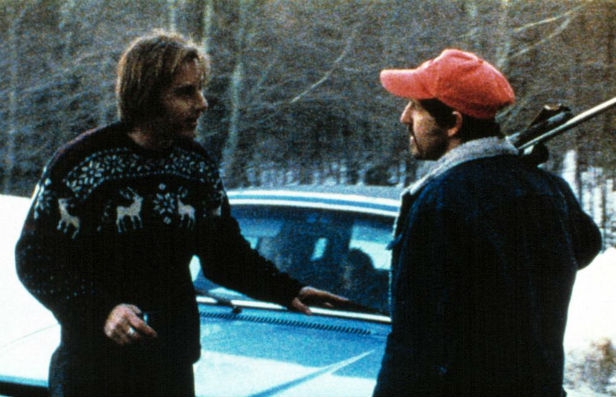
What kind of stories do you feel drawn to as a director?
Well of course I do want to direct my own stories. I’ve directed a few things that I didn’t write but usually then I go in and I tinker around. It’s mostly so that I really understand what I’m making this movie about and why. I haven’t worked particularly for a paycheque. I mean I made a TV movie called Beneath about a giant fish, but see that seemed to me to be totally delightful. My own films that I direct are all very personal in a way. As a producer, I’m very proud of the movies that are out of the genre that I’ve supported. Kelly Reichardt, Rick Alverson. It doesn’t all have to be horror, but when I do my own films they drift into horror very quickly! [laughs] Although I have a musical! I do have a musical I would like to make!
For the films you’ve produced, like The House Of The Devil or Stake Land, how do those projects come about?
Somebody emails me. Haha! I have this compulsion to do as much as I can, and I’m saying it out loud because I’ve got to make a new decision about a film, and I’ve got to take care of my own work because in the end that is your legacy. So I’m trying to get back to directing a film and that’s what I’m hoping I’ll be focusing on next. But in the meantime I’m sure I’ll be falling down the stairs or get axed in the head for some low-budget film somewhere! [laughs]
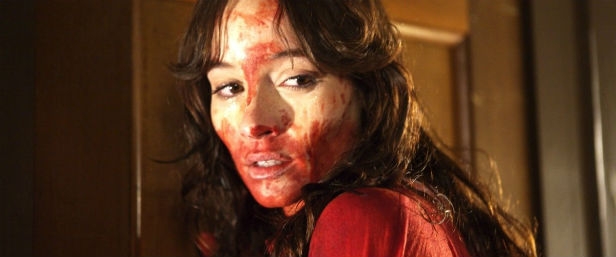
Do you feel separate from the studio system?
Yes I do. I feel left out in the cold! Because I think I could make a film under the system. I tried to make the remake of The Orphanage with Guillermo del Toro, and that was a great experience until it wasn’t. I had an amazing time writing the script and was handsomely paid, and I got to hang out with Guillermo and we batted ideas back and forth and I was interacting with the studios there, and some of their notes I was resisting, but that’s the same with anything. You always have battles, maybe with your collaborators or maybe with your financial guys. It’s part of the pleasure of it all and part of the frustration, but that’s life.
I don’t have anything against the studio movies, I think we’re in a pretty good place film-wise right now. The indie movies, I’m just going to say Babadook because it’s a recent out of the blue movie, that’s cool, and some of the stuff from Jason Blum has been good but I think it’s getting a little redundant now. What you want is someone to take chances and unfortunately the studio gets hooked into something that’s working and then they’ll repeat that until it becomes a dead horse. You have to suffer through these cycles. Same with the real business, the superhero thing. How many more articles do you have to read saying “The public is getting tired of superheroes?” And yet we have at least seven more years of it being propped up, and it just makes you want to tear your eyeballs out.
Just thinking about Crimson Peak, it does seem that Guillermo del Toro is pretty much the only filmmaker who can make these big budget horror movies at the moment…
Well, thank God for that. I know that Guillermo has tremendous passion for it so let him do it. But when I was little, of course you had Texas Chain Saw Massacre and Night Of The Living Dead, these rogue outsider pieces, but it was also cool that Hollywood was making The Omen, The Exorcist, even though that was by an auteur it was a Hollywood film, and so in a weird way Hollywood has sort of turned its back on the genre and let the mini majors do it like Jason Blum. Well, I guess we have a resurgence of Alien, though Prometheus didn’t have enough monster in it for me. I can’t quite call that a monster movie yet, let’s see the next one. And then I mean, I may be alone in this but I liked the Godzilla movie, I’m ready to see more from that dude or that design, that approach, so once again, it’s all going on. And look, Jurassic Park was a huge movie! Now, I love those movies because I love those movies because I want to see real dinosaurs running around, so I was happy!
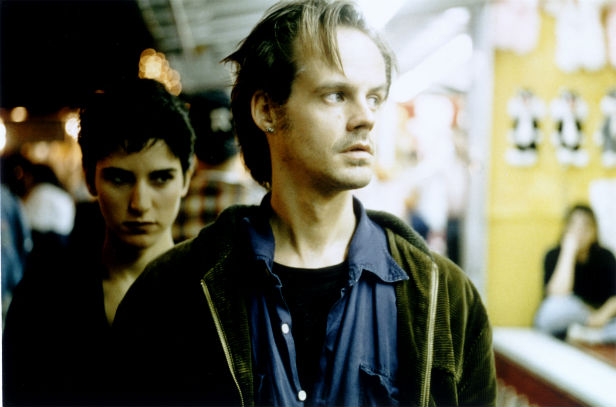
Looking back at your early days starting out in the horror genre, do you think the situation has changed for the first-time filmmakers you’re working with now?
Yes. I think what’s interesting is that horror is actually a little bit more accepted in that people are realising it’s a good way to make a film early in your career. I don’t know, maybe I’m saying that more studios like Oscilloscope, which did Body, normally we would associate that with artier films like Kelly Reichardt and so on. And Sundance is now willing to play, if you can follow me, some thoughtful horror.
See, when I was younger I was bitter about Sundance because they wouldn’t play my movies but they’d take really goofy horror movies and play them at midnight and laugh at the genre. Well, I think they’ve matured and now they’re willing to admit that somebody will make a Let The Right One In and that’s actually cinema and that will be taken a little more seriously, so that’s all a good thing. Then you also have the fact that people have access to these cameras now and you can make a movie like Body for very little money. Obviously the elephant in the room is the location that Body is shot in. Because you couldn’t rent or pay somebody to go into that home, but the filmmakers had a connection, so they said to their rich friend can we shoot in your dad’s house, and that’s why there’s this massive production value, but otherwise it’s a tiny budgeted film.
So there’s a lot going on and the one problem is distribution and actually getting paid for your movie, because of course there’s many platforms you can play your movie on, but the accounting with things like VOD and Netflix is very shady and that’s making it hard to sustain a career in the low budget movies. I used to be able to sell these movies for a good enough amount to the video distributor and they needed content. But it’s like the music business, the kids expect this stuff to be free somehow, streaming for free, but how do the artists get paid?
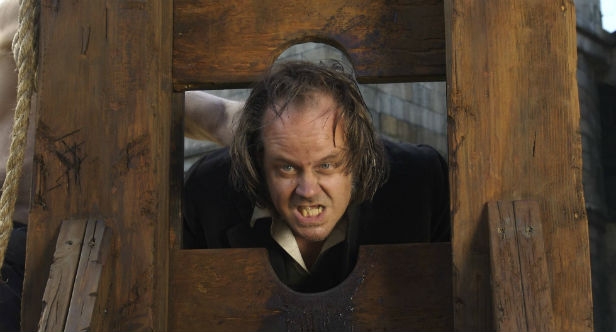
You mentioned Kelly Reichardt; Glass Eye Pix produced her films Wendy And Lucy and Night Moves, which are acclaimed art-house dramas. Are you happy to be thought of as a horror filmmaker?
You know what, I’m very proud of it. It’s a bastard genre and I stand by it. I think the world is a frightening place and people should be shocked out of their complacency. Now the irony is, I don’t know that everybody thinks of horror that way, but I think of it as a confrontational genre, a way to scream from the rafters, ‘Look at humanity, it needs fixing, it’s a mess, look at how we treat each other.’ So I use it as a punishing genre! [laughs]
I love it, and I also love the aesthetic of horror, the creepy, the cobwebby cellars and corridors, I like the darkness and I like the night and a big full moon and a creaking tree. So these are actually purely aesthetic things and you can almost not quite put your finger on why you’re like that. I think it’s literally psychology or something dreadful happened when I was a kid that I don’t remember [laughs].
But at the same time I do resent not being taken seriously as a filmmaker because you’re involved in the genre. I think that’s just an oversight of the culture and so it will be. People actually are afraid of death and they’re a little wary of people who are constantly harping about death [laughs]! So you’re a little bit like the weird guy in the room, let’s face it, and that’s like being a punk rocker, it makes me feel OK, I don’t mind. I don’t know that the pristine glowing happy smiling society is particularly accurate to our experience in life so I’d rather call it like it is: a bit of a scary place.
What have you got coming up?
I do have a box-set coming out in the US, I don’t know if it’s all regions but it’s a great honour to be celebrated in that way. I also have a series with my comrade Glenn McQuaid of audio dramas called Tales From Beyond The Pale and we have a new season coming out. And those are really cool. You can get them on iTunes and there are also beautiful box-sets of CDs. So we have all that coming and there’s a lot of retrospectives and stuff happening because this is the 30th anniversary of Glass Eye Pix. So I’m riding on that wave for a little while and then I’m hoping to get back in production in 2016.
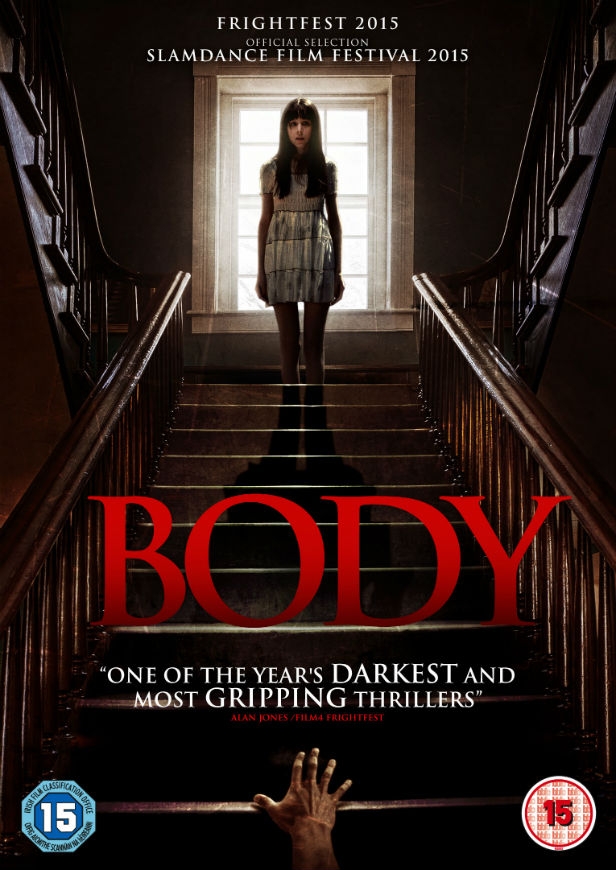
You can buy Body on DVD for £7 at Amazon.co.uk. Keep up with the latest genre news with the new issue of SciFiNow.
